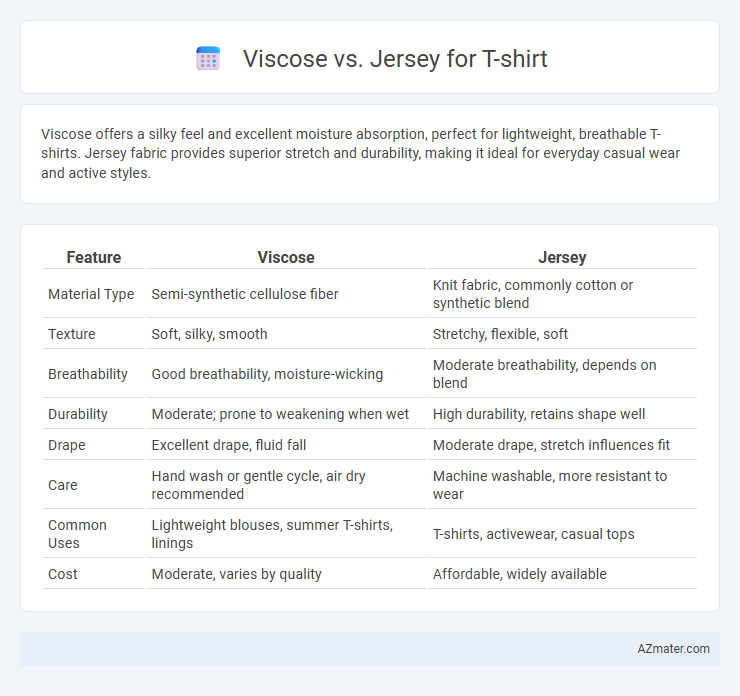Viscose offers a silky feel and excellent moisture absorption, perfect for lightweight, breathable T-shirts. Jersey fabric provides superior stretch and durability, making it ideal for everyday casual wear and active styles.
Table of Comparison
| Feature | Viscose | Jersey |
|---|---|---|
| Material Type | Semi-synthetic cellulose fiber | Knit fabric, commonly cotton or synthetic blend |
| Texture | Soft, silky, smooth | Stretchy, flexible, soft |
| Breathability | Good breathability, moisture-wicking | Moderate breathability, depends on blend |
| Durability | Moderate; prone to weakening when wet | High durability, retains shape well |
| Drape | Excellent drape, fluid fall | Moderate drape, stretch influences fit |
| Care | Hand wash or gentle cycle, air dry recommended | Machine washable, more resistant to wear |
| Common Uses | Lightweight blouses, summer T-shirts, linings | T-shirts, activewear, casual tops |
| Cost | Moderate, varies by quality | Affordable, widely available |
Introduction to Viscose and Jersey Fabrics
Viscose is a semi-synthetic fiber made from regenerated cellulose, known for its silky texture, breathability, and softness, making it ideal for lightweight, comfortable t-shirts. Jersey fabric, typically knitted from cotton, polyester, or blends, offers excellent stretch, durability, and a smooth surface that adapts well to casual and athletic wear. Choosing between viscose and jersey depends on desired comfort, breathability, and fabric behavior in t-shirt applications.
Fabric Origins: What is Viscose?
Viscose, derived from cellulose fibers extracted from wood pulp or bamboo, offers a soft and breathable fabric option frequently used for T-shirts. This semi-synthetic fiber undergoes chemical processing to transform natural materials into a smooth, silk-like texture that enhances comfort and drape. Unlike jersey, which is typically cotton-based and knitted for stretch, viscose provides a lightweight, moisture-absorbing alternative ideal for breathable, luxurious clothing.
Understanding Jersey: Composition and Characteristics
Jersey fabric is primarily composed of cotton or a cotton blend, though variations may include synthetic fibers like polyester or elastane for added stretch and durability. Known for its distinctive knit structure, jersey offers a soft, breathable, and lightweight texture ideal for t-shirt comfort and flexibility. Its natural elasticity allows for excellent shape retention, making jersey a popular choice in casual and activewear garments.
Softness and Comfort Comparison
Viscose offers a silky softness and excellent breathability, making it ideal for lightweight, comfortable T-shirts that feel gentle against the skin. Jersey fabric, typically made from cotton or a cotton blend, provides a stretchy, smooth texture with a cozy, snug fit that enhances comfort during active wear. While viscose excels in drape and softness, jersey's elasticity and resilience make it a popular choice for everyday casual T-shirts prioritizing comfort and flexibility.
Breathability: Which Fabric is Cooler?
Viscose offers superior breathability compared to jersey due to its natural wood pulp fibers that allow better air circulation and moisture absorption, making it cooler for hot weather. Jersey, typically made from cotton or synthetic blends, provides moderate breathability but tends to retain more heat and moisture. For T-shirts designed to keep you cool and comfortable, viscose is the optimal fabric choice.
Durability: How Viscose and Jersey Hold Up
Viscose offers a smooth, silky texture but tends to have lower durability, often losing shape and strength after repeated washing. Jersey, typically made from cotton or cotton blends, provides superior stretch and resilience, maintaining its form and softness over time. For long-lasting T-shirts, jersey fabric is generally preferred due to its robust wear resistance and ability to withstand frequent laundering.
Moisture Management and Sweat Absorption
Viscose fibers exhibit excellent moisture management due to their high absorbency, drawing sweat away from the skin and promoting quick drying, which enhances comfort during physical activities. Jersey fabric, often made from cotton or blends, offers good breathability but generally absorbs moisture more slowly and retains sweat longer, potentially leading to a clammy feel. Choosing viscose-based jersey T-shirts optimizes sweat absorption and moisture wicking, making them ideal for activewear or hot climates.
Care Instructions: Washing and Maintenance
Viscose t-shirts require gentle washing in cold water to prevent shrinking and fabric damage, preferably hand-washed or machine-washed on a delicate cycle with mild detergent. Jersey fabric t-shirts offer more durability and can usually be machine-washed in warm water, maintaining shape and softness with regular care. Both fabrics benefit from air drying instead of tumble drying to extend garment longevity and reduce the risk of pilling or distortion.
Environmental Impact of Viscose vs Jersey
Viscose production involves significant environmental challenges, including high water consumption, use of toxic chemicals, and deforestation linked to rayon wood sourcing, making its ecological footprint considerable. Jersey fabric, often made from cotton or synthetic blends, varies widely in environmental impact depending on material origin; organic cotton jersey has a lower footprint due to sustainable farming practices, but synthetic blends contribute to microplastic pollution. Choosing eco-friendly certified viscose like Lyocell or organic and recycled jersey options enables reduced environmental impact in t-shirt manufacturing.
Best Uses: Choosing the Right Fabric for Your T-shirt
Viscose offers a silky texture and excellent breathability, making it ideal for lightweight, dressier T-shirts that require a smooth drape and moisture-wicking properties. Jersey fabric, commonly made from cotton or blends, provides superior stretch, durability, and comfort, perfect for casual, everyday wear and active lifestyles. Selecting between viscose and jersey depends on your needs: choose viscose for soft, stylish pieces and jersey for versatile, breathable, and resilient T-shirts.

Infographic: Viscose vs Jersey for Tshirt
 azmater.com
azmater.com